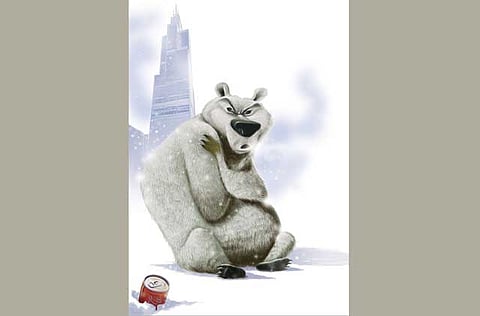So much for global warming
It was so cold in North America last week that bare skin froze in seconds and polar bears stayed indoors

It was so cold in Chicago last week, the polar bears at the city zoo weren’t allowed outside; lawyers kept their hands in their own pockets; instead of shouting “freeze” at fleeing thugs, cops shouted “thaw” — and those fleeing thugs kept their pants pulled up to their waist. Even Miley Cyrus kept her assets covered.
It was the week in which Canadians, instead of asking “Is it cold enough for ya, eh?”, simply chattered their teeth as the rest of the world was introduced to the phrase “polar vortex” — so much for global warming.
According to weathermen, every US state — even tropical Hawaii — had subfreezing temperatures. In Florida, seniors turned off the air conditioning in their peach-coloured Cadillacs as they cruised the Naples strip looking for early bird specials, featuring warm buffets, and looked for the thermostat on their golf buggies after covering up their chilly nine irons with snugly hoods.
It’s the coldest winter in 20 years, the last time a polar vortex snuck down south of Hudson Bay and made Atlanta, Georgia colder than Red Square, Moscow. The gremlins in the Kremlin were positively basking in minus 10 degrees Celsius sunshine while the bravest in Atlanta risked frostbite as their Big Gulps turned to Slushies.
In Toronto, where you’d imagine the hardy folks there know a brass monkey needs a welder, it was so cold that the softies running Pearson International Airport shut down tarmac operations because the mercury hit minus 40 degrees Celsius. That brought travel chaos as 1,500 flights were cancelled, delayed or diverted. Service was frozen solid; baggage handlers risked frostbite loading planes and the metal on the baggage carts caused instant frostbite if touched by bare skin.
Around the US there were close to 10,000 flight delays.
Last Sunday, at Lambeau Field in Green Bay, 50,000 turned up to watch their Packers lose an NFL playoff game. It was a brisk minus 25 degrees Celsius at field level and there were icicles on the icicles as hot dogs were washed down with cold ones.
What made the weather all the more depressing and stressful was the fact that the cold war broke out on the day that most North Americans were getting back to work after the prolonged Christmas and New Year’s vacation stretch.
There’s nothing quite like getting up when it’s pitch black out and the fresh snow underfoot squeaks in protest as you put your boots on it. You rustle through you pockets looking for a little bottle of lock de-icer and squirt a drop into the lock, work the car key in and turn.
Then you sit in your frozen car, turn the key and hope that it turns over — usually coughing a few times from the cold air that has reached into every mechanical orifice. With the car running, you brush the snow off the car, its hood and trunk, lights and fenders, give the driveway a quick shovel — and hope that the snowplough doesn’t come by when you’re in the shower to leave a three-foot wall of snow across the end of the driveway. Then you come out 20 minutes later, ready to go to work, your slightly wet hair freezes and leaves you with hat head for the rest of the day. Then you grind your way to work for a couple of hours, listening to every traffic bulletin and then every weather report, driving on slick roads where it takes twice as long to stop as normal, you never hit the brakes hard and drive with white knuckles hoping that the truck drivers in their big rigs can actually stop if they have to.
Winter wonderland? Whoever came up with that expression needs to spend a night in a frozen Amtrak train, like 300 cold-hearted souls.
In Leamington, Ontario, a senior’s car broke down. He was lucky enough to be rescued the next day when a smart police officer thought the snowbank at the side of the road was bigger than all the other ones. His car was buried under a metre of fresh snow.
This is winter that grandparents will tell their children: “Back in the winter of ‘14, it was so cold, the cows gave ice cream instead of fresh milk and Donald Trump’s hair stayed in place.”
This polar vortex has retreated back to where ever polar vortexes retreat for two decades. Wherever it is, all 400 million North Americans will wish that it’s a cold day in Hell — it’s a small town in Michigan — before they ever have to endure one again.



